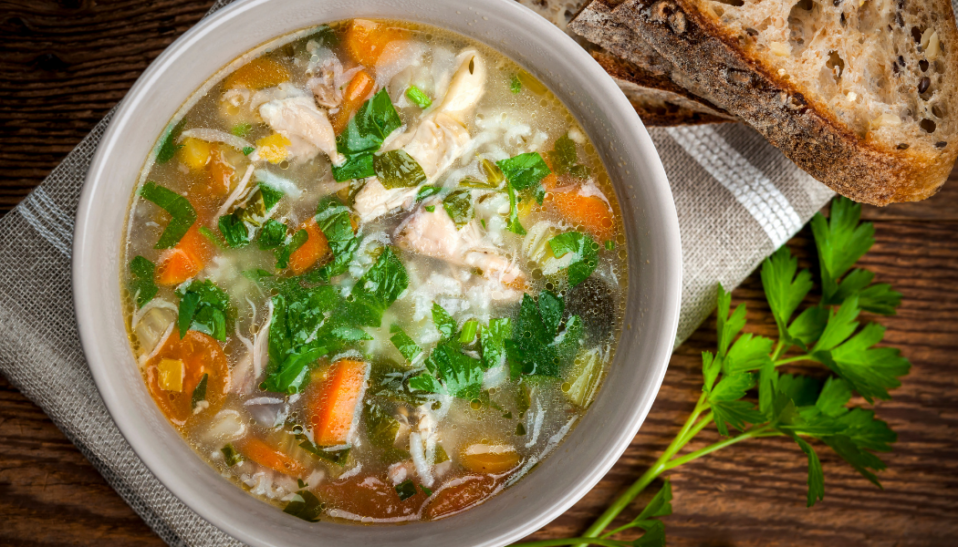Chicken soup has long been a go-to home remedy for colds and flu. But does it really help? Here’s a look at what the science says.
A Brief History of Chicken Soup as Cold Medicine
The tradition of chicken soup as a cold remedy goes back centuries and across cultures. Jewish Chinese and Italian grandmothers alike have touted the healing powers of chicken soup.
Modern medicine has not dismissed this folk wisdom Many doctors encourage drinking warm fluids, including soup, to ease congestion and stay hydrated when sick
How Might Chicken Soup Help Colds?
Research suggests several ways chicken soup may offer comfort when you’re sniffling and sneezing:
-
The hot steam from soup may help clear nasal congestion and soothe sore throats. Inhaling steam helps liquefy mucus so it can drain, providing relief.
-
The broth provides fluids, which thin mucus and prevent dehydration from fever, runny noses, and coughing. Dehydration can make cold symptoms worse.
-
Chicken contains cysteine, an amino acid that may thin mucus much like the medicines Mucinex or Robitussin.
-
Soup broth contains minerals like magnesium and calcium that may give the immune system a small boost. Zinc and vitamin C in some soups may also help.
-
The comfort of a hot, familiar food soothes when you feel crummy This placebo effect shouldn’t be underestimated!
Limitations of Soup for Colds
While chicken soup can temporarily alleviate some misery, it does not shorten or cure colds. Once finished, the benefits for congestion and hydration quickly fade.
Most soups don’t contain enough cysteine, zinc, or vitamin C at optimal dosing and timing to substantially impact cold symptoms or duration. Supplements in proper doses are more effective.
Broths and soups vary in preparation methods and ingredients. Not all provide the same benefits. Certain ingredients like garlic or ginger may add extra immune-boosting properties.
The placebo effect also differs based on personal preferences and memories. For some, only mom’s signature soup can conjure the powerful mind-body benefits.
Tips for Maximum Relief from Chicken Soup
To get the most out of chicken soup when you’ve got the sniffles:
-
Choose broth-based soups with chicken meat and minimal creamy or thick ingredients, which can worsen congestion. Eggs or noodles are okay.
-
Make it spicy! Adding garlic, onions, ginger, or cayenne pepper delivers extra anti-inflammatory and decongestant effects.
-
Sip the soup slowly, inhaling the steam. This maximizes nasal clearing. Caution – don’t burn your mouth!
-
Consume soup piping hot. Heat is key for thinning mucus effectively. Lukewarm soup doesn’t work as well.
-
Stay hydrated by drinking the broth after you finish the solids. Refill your bowl.
-
Try adding immune-boosting ingredients like turmeric, shiitake mushrooms, or astragalus root.
-
Make it comforting with nostalgic garnishes and sides, like oyster crackers or a grilled cheese sandwich.
The Verdict on Chicken Soup
While chicken soup is no miracle cure, science shows it can temporarily lessen some cold symptoms. The combination of warm fluids, salt, nutrients, and aroma delivers real benefits – along with a healthy dose of placebo magic. When you’ve got the sniffles, chicken soup is still good food and good medicine.

What’s in Chicken Noodle Soup?
Chicken noodle soup is more than just a feel-good meal; it’s a carefully balanced mix of ingredients that can support health. This classic soup contains chicken, noodles, carrots, celery, and onions—each adding unique nutrients. Chicken provides a high-quality protein essential for tissue repair. Carrots are rich in beta-carotene, which is converted to vitamin A in the body to support immune function. Celery offers antioxidants and essential minerals, while onions add a burst of flavor and vitamin C. Together, these ingredients create a comforting bowl that not only warms the body but also nourishes it.
Soup for Hydration and Electrolytes
Chicken noodle soup isnt just comforting; its also a source of hydration and electrolytes. The broth provides essential fluids to help combat dehydration, while the soups sodium and potassium content replenishes electrolytes.
Remember, while chicken noodle soup can aid in hydration and electrolyte replenishment, it is important that your child drink plenty of fluids throughout the day to ensure optimal hydration. Water, herbal teas, and clear broths are also beneficial additions to your recovery regimen.
Why is chicken noodle soup a cure for a cold?
FAQ
Why does chicken soup help you when you’re sick?
“The 2000 study basically found that chicken soup inhibited neutrophil chemotaxis, which is a fancy way of saying it helped temporarily decrease inflammation so those who were sick could temporarily breathe easier,” Pike said.
Does chicken broth break up mucus?
According to a study, chicken soup can help clear mucus from nasal passages and relieve congestion better than other hot liquids.
Is chicken broth really good for a cold?
Compared with hot water alone, studies show chicken soup is more effective at loosening mucus. The herbs and spices sometimes used in chicken soup, such as pepper and garlic, also loosen mucus. The broth, which contains water and electrolytes, helps with rehydration.
Why is chicken soup good for a cold?
Chicken is especially rich in a compound called carnosine, and it’s this that studies suggest helps reduce that stuffy, congested feeling in your nose and throat. It’s thought that carnosine minimises inflammation in the upper respiratory tract by stopping the migration of white blood cells.
